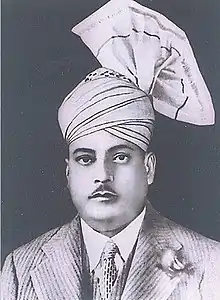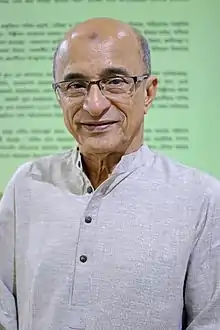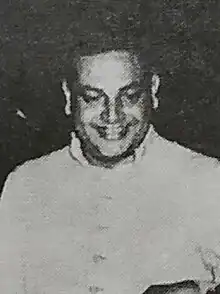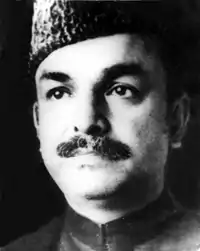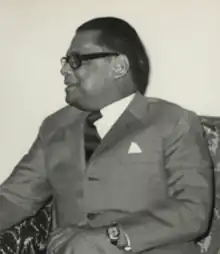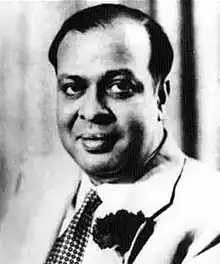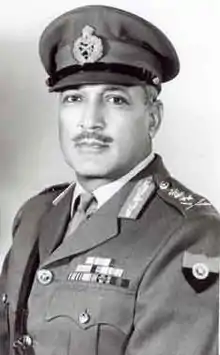Chowdhury
Chowdhury is a title of honour, usually hereditary, originating from the Indian subcontinent.[1] It is an adaption from Sanskrit. During the Mughal rule, it was a title awarded to eminent people, while during British rule, the term was associated with zamindars and social leaders. The common female equivalent was Chowdhurani.[2] Many landlords under the Permanent Settlement carried this surname. Land reforms after the partition of India abolished the permanent settlement. In modern times, the term is a common South Asian surname for both males and females.
| Pronunciation | chow-dhuree chaw-dree chow-dree |
|---|---|
| Origin | |
| Meaning | Holder of four; four-way duties; four responsibilities |
| Region of origin | Indian subcontinent |
| Other names | |
| Variant form(s) | Chaudhary, Chaudri, Choudhary, Chaudhry, Chowdary, Chowdhary, Chaudry, Choudary, Choudhry, Chaudhuri, Chaudhari, Chudhry, Choudhari, Choudhury, Chowdhuri, Chowduri, Chaudhurani, Choudhurani, Chowdhurani, Chowdhrani, Choudhrani, Chaudhrani. |
Meaning and significance
"Chowdhury" is a term adapted from the Sanskrit word caturdhara, literally "holder of four" (four denoting a measure of land), from chatur ("four") and dhara ("holder" or "possessor").[3] The name is a Sanskrit term denoting the head of a community or caste.[4][5] It was a title awarded to persons of eminence, including both Muslims and Hindus, during the Mughal Empire. It was also used as a title by military commanders responsible for four separate forces, including the cavalry, navy, infantry and elephant corps.[4] These people belonged to the zamindar families in British India.[6]
Regional
In the Chittagong Hill Tracts, the titular Rajas of the Bohmong Circle and Mong Circle have the surname Chowdhury.[7][8][9][10]
The Bengali Muslim Mirashdars[note 1] living in the former Kachari Kingdom were given titles by the Kachari Raja, which in modern-day acts as a surname for them.[12]
In Bihar, the Pasi are also known as the Chaudhary, a community traditionally connected with toddy tapping.[13]
Many Marwaris coming from Agarwal and Maheshwari sub community also use surname as Choudhary or Chaudhary.
Deshastha Brahmins and Kammas from Andhra Pradesh and Telangana who got this as a title during Qutb Shahis of Golconda and Nizams of Hyderabad also use Chowdhari or Chowdhury as their surnames.[14][15][16]
In the Punjab, Chaudhary is used by several Punjabi tribes. It is typically used as a prefix before the given name, often represented by the prefix 'Ch'.
Alternate spellings
Its alternate spellings include: Chaudhary, Chaudri, Choudhary, Chaudhry, Chowdary, Chowdhary, Chaudry, Choudary, Choudhry, Chaudhuri, Chaudhari, Chudhry, Choudhari, Choudhury, Chowdhuri and Chowdury.[4] The female equivalent is Chaudhurani and alternate spellings include: Choudhurani, Chowdhurani, Chowdhrani, Choudhrani, Chaudhrani.
Notable people
Bangladesh
- Justice A. F. M. Ahsanuddin Chowdhury, 9th President of Bangladesh
- A. H. Abdul Gafur Chowdhury, politician
- A. K. M. Rafiq Ullah Choudhury (1923–2011), former chairman of Sandwip Upazila
- A. N. Muhammad Momtaz Uddin Choudhury (1923–2005), first vice-chancellor of Islamic University, Bangladesh
- A. T. Muhammad Nurul Bashar Chowdhury, former chairman of Kutubdia Upazila Council
- Abeda Chowdhury (born 1942), politician
- Abdul Hakeem Chowdhury (1924–1986), president of Sunamganj Awami League
- Abdul Halim Chowdhury (1928–1987), former minister of Agriculture and Food
- Abdul Hye Choudhury, politician
- Abdul Kahir Chowdhury, former parliamentarian
- Abdul Latif Chowdhury Fultali (1913–2008), Islamic scholar and writer
- Abdul Mannan Choudhury (born 1948), vice-chancellor of World University of Bangladesh
- Abdul Mannan Chowdhury, politician
- Abdul Matin Chaudhary (1895–1948), minister and politician
- Abdul Matin Chowdhury (1921–1981), academic and physicist
- Abdul Matin Chowdhury (1944–2012), politician
- Abdul Matin Chowdhury Shaikh-e-Fulbari (1915–1990), religious scholar and political activist
- Abdul Munim Chowdhury (born 1967), former MP for Habiganj-1
- Abdur Rab Chowdhury (1934–2018), secretary for the Ministry of Agriculture
- Abdur Rouf Choudhury (1929–1996), writer
- Abdur Rouf Chowdhury (1935–2014), politician
- Abdus Salam Chowdhury, former parliamentarian
- Abdus Sattar Chowdhury, politician
- Abidur Reza Chowdhury (1872–1961), educationist and politician
- Abu Lais Muhammad Mubin Chowdhury (1973–2013), former MP for Habiganj-3
- Abu Naser Chowdhury, politician
- Abu Osman Chowdhury (1936–2020), Sector Commander of the Mukti Bahini
- Abul Fayez Muhammad Abdul Alim Chowdhury (1928–1971), martyred ophthalmologist
- Abul Hasnat Chowdhury, politician
- Abul Kalam Azad Chowdhury (born 1946), 23rd vice-chancellor of the University of Dhaka and 11th chairman of the University Grants Commission
- Abul Kalam Muhammad Ahsanul Hoque Chowdhury (born 1968), former MP
- Abul Khair Chowdhury, former State Minister of Youth and Sports
- Akram Hossain Chowdhury, politician
- Altaf Hossain Chowdhury (born 1942), former Air Force chief
- Altaf Hossain Chowdhury, politician
- Altafur Rahman Chowdhury (1926–2018), member of Awami League
- Aminul Islam Chowdhury (born 1921), founding chairman of Chittagong Chamber of Commerce & Industry
- Amir Khasru Mahmud Chowdhury (born 1949), former Minister of Commerce
- Amirul Islam Chowdhury (born 1942), 7th vice-chancellor of Jahangirnagar University and former president of Asiatic Society
- Anisul Haque Chowdhury (1926–2011), politician
- Anisul Haque Chowdhury Rizu, politician
- Anwar Hossain Chowdhury, retired brigadier general
- Anwarul Kabir Chowdhury, former parliamentarian
- Anwarul Karim Chowdhury (born 1943), former UN Under Secretary General
- Ariful Haque Choudhury (born 1959), former Mayor of Sylhet
- Ayesha Bedora Choudhury (1935–1971), doctor
- Azizul Haque Choudhury, politician
- Azizur Rahman Chowdhury (1946-2011), Islamic scholar and politician
- Chanchal Chowdhury (born 1971), actor
- Chowdhury Abdul Hai, advocate and politician
- Chowdhury Abdullah Al-Mamun (born 1964), 29th Inspector General of Bangladesh Police
- Chowdhury Abu Torab Khan (died 1767), nobleman
- Chowdhury Gulam Akbar, writer and collector of Bengali folk literature for the Bangla Academy
- Chowdhury Harunur Rashid (died 2000), founding president of Bangladesh Trade Union Centre
- Chowdhury Khurshid Alam, politician
- Chowdhury Motahar Hossain, politician
- Dewan Shahjahan Eaar Chowdhury, politician
- Didarul Alam Chowdhury, first chairman of Ramu Upazila Council
- Ebadur Rahman Chowdhury, former State Minister of Food
- Ekramul Karim Chowdhury (born 1962), secretary-general of Noakhali Awami League
- Enamul Haque Chowdhury (1948–2011), politician
- Erfan Reza Choudhury, former MNA
- Farid Uddin Chowdhury (born 1947), teacher, politician and businessman
- Gias Uddin Chowdhury, politician
- Golam Ali Chowdhury, Zamindar of Haturia and philanthropist
- Golam Jilani Chowdhury, former chairman of Sunamganj District Council
- Golam Mohiuddin Chowdhury, retired major general
- Gulzar Ahmed Chowdhury (1937–2019), politician
- Hamidul Huq Choudhury (1901–1992), former Minister of Foreign Affairs
- Harris Chowdhury, former MP for Sylhet-5
- Hasan Mashhud Chowdhury, 11th Chief of Army Staff of the Bangladesh Army
- Humayun Kabir Chowdhury, former chairman of Patnitala Upazila Council
- Iftekhar Ahmed Chowdhury, diplomat and former Foreign Affairs Adviser
- Iqbal Hossain Chowdhury (1944–2001), former Minister of Food
- Iqbal Sobhan Chowdhury (born 1949), editor of The Daily Observer and media adviser to the Prime Minister
- Ismat Ahmed Chowdhury, politician
- Izharul Islam Chowdhury, Bangladeshi Islamic scholar
- Jafrul Islam Chowdhury (1950–2022), former State Minister of Environment and Forest
- Jahangir Alam Chowdhury (born 1953), 7th Principal Staff Officer of Armed Forces
- Jahed Ali Chowdhury (1947–2011), former president of Mohammedan SC
- Jamilur Reza Choudhury, president of Bangladesh Mathematical Olympiad, vice-chancellor of University of Asia Pacific, adviser to Caretaker Government of Bangladesh
- Kamran Hossain Chowdhury, politician
- Kamrun Nahar Chowdhury, parliamentarian
- Khalilur Rahman Chowdhury (died 2013), politician
- Khan Fazle Rub Chowdhury, former MNA
- Lutfar Rahman Chowdhury, former parliamentarian
- M. K. Alam Chowdhury, politician
- Mafiz Ali Chowdhury (1919–1994), former Minister of Natural Wealth, Science and Technology Research and Atomic Energy
- Mahbub Kabir Chowdhury, politician
- Mahmudul Islam Chowdhury (born 1950), former Mayor of Chittagong
- Mahmudul Karim Chowdhury (1938–2005), president of Bangladesh Fisherman's Society
- Mahmud Us Samad Chowdhury, former MP for Sylhet-3
- Majibul Haque Chowdhury, former parliamentarian
- Majibur Rahman Chowdhury, former MNA
- Masud Uddin Chowdhury (born 1954), 8th Principal Staff Officer of Armed Forces
- Matia Chowdhury (born 1942), former Minister of Agriculture
- Matiar Rahman Chowdhury, politician
- Mazhar Ali Chowdhury (born 1970), actor
- Mazharul Haq Shah Chowdhury, former vice-chairman of Jatiya Party
- Mehazabien Chowdhury, actress
- Mifta Uddin Chowdhury Rumi, former High Court justice
- Miftah Uddin Choudhury (born 1955), former High Court judge
- Mizanur Rahman Chowdhury (1928–2006), fifth Prime Minister of Bangladesh
- Mizanur Rahman Chowdhury (died 2013), leader of Mujib Bahini Jaldhaka branch
- Moazzem Ahmed Chowdhury, former MNA
- Mofazzal Hossain Chowdhury (born 1948), former Minister of Shipping
- Mokhlechhar Rahman Chowdhury, politician
- Monirul Haq Chowdhury (born 1946), advisor to BNP Chairman
- Monowar Hossain Chowdhury (born 1948), former chief engineer of LGED
- Mostaq Ahmad Chowdhury, former administrator and chairman of Cox's Bazar District Council
- Muhammad Yunus Chowdhury (1906—1992), Islamic scholar and founding president of Befaqul Madarisil Arabia
- Mukhlesur Rahman Chowdhury (born 1965), journalist and former advisor to the President
- Mustafizur Rahaman Chowdhury (born 1957), politician
- Muzaffar Rahman Chowdhury, former MNA
- Naiyyum Choudhury, biotechnologist and nuclear scientist
- Najma Chowdhury, founder of the Women and Gender Studies department in the University of Dhaka, adviser to Caretaker Government of Bangladesh
- Nasimul Alam Chowdhury (born 1967), former parliamentarian
- Nasir Uddin Chowdhury, politician
- Nasiruddin Chowdhury (born 1979), footballer
- Navila Chowdhury, politician
- Nazim Kamran Choudhury, former MP
- Nazir Hossain Chowdhury, politician
- Nazrul Islam Chowdhury (born 1952), parliamentarian
- Nazrul Islam Chowdhury, a judge of the High Court Division
- Nilufar Chowdhury Moni (born 1969), Secretary of BNP Central Committee
- Nitai Roy Chowdhury (born 1949), former State Minister of Education
- Noor-E-Hasna Lily Chowdhury, politician
- Nur Qutb Alam Chowdhury, lawyer and politician
- Nuruddin Chowdhury Noyon (born 1962), parliamentarian
- Nurul Alam Chowdhury (1945–2019), former ambassador to Oman and director of Rupali Bank
- Nural Hoda Choudhury, former MNA
- Nurul Islam Chowdhury (1925–1995), politician
- Nurunnabi Chowdhury (born 1968), politician
- Obaidul Muktadir Chowdhury (born 1955), former MP
- Omor Faruk Chowdhury (born 1960), former State Minister of Industries
- Rafiqul Bari Chowdhury (1930–2005), cinematographer and director
- Rafiqul Islam Chowdhury (died 2008), 9th vice-chancellor of the University of Chittagong
- Rahimullah Choudhury, former MNA
- Rashed Chowdhury, former Army officer, currently in exile in the United States
- Razzaqul Haider Chowdhury (1889–1970), former minister
- Reazul Huq Chowdhury, politician
- Rezaul Haque Chowdhury (born 1954), former MP
- Rezaul Karim Chowdhury (born 1953), incumbent Mayor of Chittagong
- Rezwana Chowdhury, renowned exponent of Tagore songs
- Rezzakul Haider Chowdhury, 14th Director General of Bangladesh Rifles
- Saber Hossain Chowdhury (born 1961), former president of Bangladesh Cricket Board
- Sadruddin Ahmed Chowdhury, physicist and vice-chancellor of Shahjalal University of Science and Technology and Sylhet International University
- Saifuzzaman Chowdhury Jewel, former president of Faridpur Sramik League
- Salah Uddin Shoaib Choudhury, editor of Weekly Blitz
- Salek Chowdhury, physician and politician
- Samarjit Roy Chowdhury, painter
- Shahriar Chowdhury Emon, actor better known as Salman Shah
- Serajul Islam Choudhury (born 1936), literary critic and essayist
- Serajunnessa Choudhury (1910–1974), politician and businesswoman
- Shafi Ahmed Chowdhury, businessman and politician
- Shahadat Hossain Chowdhury (born 1959), election commissioner and retired brigadier general
- Shahadat Hossain Chowdhury (died 2021), politician
- Shahdab Akbar Chowdhury Labu, politician
- Shah-e-Jahan Chowdhury, politician
- Shahjahan Chowdhury, president of Cox's Bazar BNP branch
- Shahjahan Chowdhury, film director and scriptwriter
- Shajahan Chowdhury, vice-president of Jamaat-e-Islami Chittagong
- Shah Newaz Chowdhury (died 1997), politician
- Shah Rafiqul Bari Chowdhury, former parliamentarian
- Shah Sirajul Islam Chowdhury, politician
- Shahiduddin Chowdhury Annie (born 1968), vice-chairman of APPG
- Shahinur Pasha Chowdhury (born 1985), vice-president of Jamiat Ulema-e-Islam Bangladesh
- Shamima K Choudhury, physicist and advocate for women in science
- Shamsher M. Chowdhury, diplomat and former secretary of the Ministry of Foreign Affairs
- Shamsuddin Ahmad Chowdhury, physician and politician
- Shamsul Haque Chowdhury (1936–2008), politician
- Shamsul Haque Chowdhury (born 1957), general secretary of Chittagong Abahani Limited
- Shamsul Huda Chaudhury (1920–2000), third Speaker of the Bangladesh National Parliament
- Shankar Gobind Chowdhury (1926–1995), former Governor of Natore
- Shawkat Chowdhury (born 1963), politician
- Shirin Sharmin Chaudhury (born 1966), Speaker of the Bangladesh National Parliament
- Shayan Chowdhury, Bengali indie musician and singer
- Shegufta Bakht Chaudhuri, 4th Governor of Bangladesh Bank
- Sirajul Islam Chowdhury, advisor to Jatiya Party chairman
- Sultan Ahmed Chowdhury (1932–1992), deputy speaker of parliament
- Sultana Zaman Chowdhury, politician
- Sultanul Kabir Chowdhury (1946–2014), politician
- Syed Maskarul Alam Chowdhury, former parliamentarian
- Tajul Islam Choudhury (1944–2018), former Opposition Chief Whip
- Tapan Chowdhury, Bengali singer of Adhunik songs
- Tawfiq-e-Elahi Chowdhury (born 1945), energy adviser to the Prime Minister
- T. I. M. Fazle Rabbi Chowdhury (1934–2018), six-time MP and former leader of the Jatiya Party (Zafar)
- Upendrakishore Ray Chowdhury (1863–1915), writer, painter and aristocrat
- Yahya Chowdhury (born 1964), secretary of Jatiya Party Central Committee
- Yakub Ali Chowdhury, former VP of Patuakhali Government College
- Yeamin Ahmed Chowdhury Munna, footballer for Chittagong Abahani
- Yusuf Hossain Choudhury, politician
- Zafrullah Chowdhury (1941–2023), founder of Gonoshasthaya Kendra
- Zahur Ahmad Chowdhury (1916–1974), former Minister of Health and Family Welfare
- Zakaria Khan Chowdhury (1933–2021), former parliamentarian
- Zulfiqar Mortuza Chowdhury, politician
- Chowdhury family of Aruakandi, Gopalganj
- Samson Hossain Chowdhury (1925–2012), chairman of Square Pharmaceuticals
- Tapan Chowdhury, businessman and adviser to the caretaker government
- Anjan Chowdhury (born 1954), industrialist
- Chowdhury family of Balia, Thakurgaon
- Nurul Huq Choudhury (1902–1987), parliamentary secretary
- Rezwanul Haque Idu Chowdhury (1930–1994), former Minister of Social Welfare
- Chowdhury family of Batgram, Comilla
- Ashrafuddin Ahmad Chowdhury (1894–1976), former Education Minister
- Rabeya Chowdhury, president of Comilla BNP branch
- Chowdhury family of Bahubal, Habiganj
- Manik Chowdhury (1933–1991), former governor of Habiganj Subdivision
- Amatul Kibria Keya Chowdhury, politician
- Chowdhury family of Khanpur, Gopalganj
- Mohabbat Jan Chowdhury, former Home Minister
- Sarwar Jan Chowdhury, politician
- Chowdhury family of Baliadi, Gazipur
- Chowdhury Kazemuddin Ahmed Siddiky (1876–1937), former president of the Eastern Bengal and Assam Muslim League and co-founder of Dhaka University
- Badruddin Ahmed Siddiky (1915-1991), former Chief Justice of East Pakistan
- Chowdhury Abraruddin Ahmed Siddiky, leader of the East Bengal Film Association
- Chowdhury Tanbir Ahmed Siddiky (born 1939), former Minister of Commerce
- Chowdhury family of Dargapasha, Sunamganj
- Abdur Rasheed Choudhury (died 1944), businessman and politician
- Humayun Rashid Choudhury (1928–2001), 41st President of the United Nations General Assembly
- Faruk Rashid Chowdhury, former State Minister of Finance
- Chowdhury family of Dhampur, Mymensingh
- Aftab Uddin Chowdhury (1913–1985), founding secretary of Bhaluka Pilot High School
- Aman Ullah Chowdhury (died 2014), politician
- Chowdhury family of Dhanbari, Tangail
- Syed Nawab Ali Chowdhury (1863–1929), former Minister for Education
- Syed Mohammad Ali Chowdhury (1909–1963), former Prime Minister of Pakistan
- Syed Hasan Ali Chowdhury (1910–1981), former Minister for Commerce and Industry
- Chowdhury family of Dhantala, Dinajpur
- Abdur Rauf Chowdhury (1937–2007), former State Minister for Post and Telecommunications
- Khalid Mahmud Chowdhury (born 1970), State Minister of Shipping
- Chowdhury family of Duttapara, Madaripur
- Ilias Ahmed Chowdhury (1934–1991), politician
- Noor-E-Alam Chowdhury Liton (born 1964), Chief Whip of the Bangladesh Parliament
- Mujibur Rahman Chowdhury Nixon (born 1978), presidium member of Jubo League
- Chowdhury family of Faridpur
- Chowdhury Moyezuddin Biwshash (1840–1923), merchant and aristocrat
- Chowdhury Abd-Allah Zaheeruddin (1903–1967), former Minister of Health, Labor and Social welfare
- Yusuf Ali Chowdhury (1905–1971), former Minister of Agriculture
- Chowdhury Kamal Ibne Yusuf (1940–2020), former Minister of Disaster Management
- Chowdhury Akmal Ibne Yusuf (1945–2021), politician
- Chaudhry family of Gahira, Chittagong
- AKM Fazlul Kabir Chowdhury (1917–1972), Leader of the Opposition at the East Bengal Legislative Assembly
- Fazlul Qadir Chaudhry (1919–1973), 5th Speaker of the National Assembly of Pakistan
- A. B. M. Mohiuddin Chowdhury (1944–2017), three-time Mayor of Chittagong
- Salahuddin Quader Chowdhury (1949–2015), six-time MP and former adviser to the Prime Minister
- A.B.M. Fazle Karim Chowdhury (born 1954), four-time MP
- Giasuddin Quader Chowdhury, two-time MP
- Mohibul Hasan Chowdhury (born 1983), Deputy Minister of Education
- Chowdhury family of Gomnati, Nilphamari
- Muhammad Rafiqul Islam Chowdhury, 8th vice-chancellor of Islamic University Bangladesh
- Muhammad Shahrin Islam Chowdhury Tuhin, president of Nilphamari BNP
- Chowdhury family of Guthuma, Feni
- Habibullah Bahar Chowdhury (1906–1966), former Health Minister
- Begum Shamsunnahar Chowdhurani (1908—1964), writer, educator and politician
- Parveen Sultana Chaudhury (1940–2004), writer and academician
- Iqbal Bahar Chowdhury (born 1940), news presenter and elocutionist
- Chowdhury family of Haildhar, Chittagong
- Akhtaruzzaman Chowdhury Babu (1945–2012), founding chairman of United Commercial Bank PLC
- Saifuzzaman Chowdhury (born 1969), Minister of Land
- Chaudhury family of Kanihati
- Abdul Muntaquim Chaudhury (born 1929), politician
- Chowdhury family of Katakhali, Rajbari
- Abdul Wajed Chowdhury (died 1992), politician
- Salma Chowdhury (born 1971), parliamentarian
- Chowdhury family of Lakshmansri, Sunamganj
- Dewan Hason Raja Chowdhury (1854–1922), mystic poet
- Dewan Taimur Raja Chowdhury (1917–1997), former State Minister of Communications
- Chowdhury family of Maguradangi, Rajbari
- Rowshan Ali Chowdhury (1874–1933), journalist
- Yakub Ali Chowdhury (1888–1940), essayist
- Chowdhury family of Majidpur-Daihata, Munshiganj
- Kafiluddin Chowdhury (1898–1972), former Communications and Law Minister of East Pakistan
- Abul Qasim Mohammad Badruddoza Chowdhury (born 1932), 13th President of Bangladesh
- Mahi Badruddoza Chowdhury (born 1970), secretary general of Bikalpa Dhara
- Chowdhury family of Mandalpara, Cox's Bazar
- Osman Sarwar Alam Chowdhury (1937–2010), former ambassador to the UAE
- Shaimum Sarwar Chowdhury Kamal (born 1970), politician
- Chowdhury family of Monakosha, Nawabganj
- Murtaza Raza Choudhry, former State Minister for Finance
- Mainur Reza Chowdhury (1938–2004), 12th Chief Justice of Bangladesh
- Chowdhury family of Nagbari, Tangail
- Abdul Hamid Chowdhury (died 1969), Speaker of the East Pakistan Provincial Assembly
- Abu Sayeed Chowdhury (1921–1987), second President of Bangladesh
- Abul Hasan Chowdhury (born 1951), former State Minister of Foreign Affairs
- Chowdhury family of Nandail, Mymensingh
- Khurram Khan Chowdhury (1945–2021), politician
- Anwarul Hossain Khan Chowdhury (died 2013), former adviser to the president
- Chowdhury family of Natore
- Ashraf Ali Khan Chowdhury (1878–1941), politician
- Abdus Sattar Khan Chowdhury, politician
- Amjad Khan Chowdhury (1937–2015), founder of PRAN-RFL Group
- Chowdhury family of Nurshonapur, Noakhali
- Badrul Haider Chowdhury (1925–1998), fifth Chief Justice of Bangladesh
- Naima Haider Chowdhury (born 1962), Justice of the High Court Division
- Choudhury family of Ranakeli, Sylhet
- Mahmudul Amin Choudhury (1937–2019), 11th Chief Justice of Bangladesh
- Fatema Chowdhury Paru (1944–2002), politician
- Chowdhury family of Shat Aani, Bogra
- Ismat Ara Chowdhury (1941–2020), former State Minister of Public Administration
- Mamdudur Rahman Chowdhury (1946–2018), former Minister of Shipping
- Chowdhury family of Ulania, Barisal
- Abdul Gaffar Chowdhury (1934–2022), poet and political analyst
- Asad Chowdhury (born 1943), poet, writer, translator and journalist
- Kings of the Bohmong Circle
- Maung Shwe Prue Chowdhury (1915–1998), 14th King of Bohmong Circle
- Aung Shwe Prue Chowdhury (1914–2012), 15th King of Bohmong Circle
India
- Amitabh Chaudhry (born 1964/65), Indian banker, CEO and MD of Axis Bank
- Arindam Chaudhuri, Indian author
- Farukh Choudhary, Indian Association football player who plays for Jamshedpur FC in the Indian Super League
- Rahul Chaudhari, Indian kabaddi player
- Chaudhary Charan Singh, 6th Prime Minister of India
- Pratik Chaudhari (born 1989), Indian footballer playing as a defender for Jamshedpur
- Veerabhadram Chowdary, film director
- Renuka Chowdhury, Union Minister of State
- Veeramachineni Jagapathi Rao Chowdary, Telugu film actor
- Chaudhary Devi Lal, Deputy Prime Minister of India
- K. V. Chowdary, Indian Revenue Service Central Vigilance Commissioner
- Chaudhary Harmohan Singh Yadav, Shaurya Chakra awardee[17]
- Shagun Chowdhary, Indian shooter
- Chaudhary Brahm Prakash Yadav, Chief Minister, Delhi
- Mohinder Singh Chaudhury, Indian politician
- Aadesh Chaudhary, Indian actor
- R. B. Choudary, Indian film producer
- Y. S. Chowdary, Indian central minister for state
- Gurmeet Choudhary, Indian television actor
- Ranjit Chowdhry, Indian actor
- Karmveer Choudhary, Indian actor
- Kamla Chaudhry (born 1908), Indian short story writer
- Yuvika Chaudhary (born 1983), Indian actress
- Ankush Chaudhari, Marathi film actor
- Chaudhary Gurjar family of Kairana
- Chaudhary Munawwar Hasan (1964–2008), former MP
- Chaudhary Nahid Hasan (born 1988), politician
- Chaudhary Ahmed family of Nuh, Mewat
- Chaudhary Khurshid Ahmed (1934–2020), politician
- Chaudhary Aftab Ahmed (born 1966), politician
- Chaudhary Hussain family of Mewat
- Chaudhary Tayyab Husain (1936–2008), former MP and minister of state
- Chaudhary Zakir Hussain, administrator of Haryana Waqf Board
- Zahida Khan (born 1968), politician
- Chaudhary Rahim Khan family of Sultanpur, Mewat
- Chaudhary Rahim Khan (1923–1987), former MP and minister of state
- Chaudhary Sardar Khan, politician
- Chaudhary Mohammad Ilyas Khan (born 1954), politician
- Chaudhary Habib Ur Rehman (born 1957), politician
- Tewatia Jat Chaudhary Singh family of Noorpur, Meerut
- Chaudhary Charan Singh (1902–1987), 5th prime minister of India
- Chaudhary Ajit Singh (1939–2021), former union minister
- Chaudhary Jayant Singh (born 1978), chairman of National People's Party
West Bengal
- Abdul Karim Chowdhury (born 1946), former Minister for Mass Education Extension and Library Services
- Abu Taleb Chowdhury (died 1971), former MP
- Amit Chaudhuri, Fellow of the Royal Society of Literature
- Anjan Choudhury, Bengali film director and writer
- Aniruddha Roy Chowdhury, Indian film director
- Adhir Ranjan Chowdhury, member of the 16th Lok Sabha of India
- Bula Choudhury, Indian national women's swimming champion
- Chumki Choudhury, Indian actress
- Jogen Chowdhury, 21st century Indian painter
- Joyanto Nath Chaudhuri, Chief of Staff of the Indian Army
- Mahima Chaudhry, Indian actress and model
- Nirad C. Chaudhuri, Indian writer
- Noor Alam Chowdhury (1943–2021), former acting Chief Justice in Calcutta High Court
- Pramatha Chaudhuri, 19th century Bengali writer and an influential figure in Bengali literature
- Rabiul Alam Chowdhury, former MLA
- Ravi Shankar (born Rabindra Shankar Chowdhury), Indian musician and a composer of Hindustani classical music
- Rina Choudhury, Indian actress
- Saifuddin Choudhury (1952–2014), communist
- Shankar Roychowdhury, Chief of Staff of the Indian Army
- Siddiqullah Chowdhury, president of Jamiat Ulema-e-Maghribi Bangal
- Somlata Acharyya Chowdhury, Indian singer
- Sonali Chowdhury, Indian actress
- Salil Chowdhury, Indian music director & composer
- Sarita Choudhury, Indian actress and model
- Tridha Choudhury, Indian actress
- Choudhury family of Sahazalalpur, Malda
- Abu Barkat Ataul Ghani Khan Choudhury (1927–2006), former Union Minister
- Abu Nasar Khan Choudhury (born 1935), former Minister of State for Science and Technology
- Abu Hasem Khan Choudhury (born 1938), former Union Minister of State for Health and Family Welfare
- Begum Rubi Choudhurani (1945–2008), four-time MLA
- Isha Khan Choudhury (born 1971), politician
Assam
- Abdul Jalil Choudhury (1925–1989), Islamic scholar and politician
- Ambikagiri Raichoudhury, Assamese poet
- Anwaruddin Choudhury (born 1959), naturalist
- Avinov Choudhury (born 1999), cricketer
- Khalilur Rahman Chowdhury, MLA for Jamunamukh
- Mahendra Mohan Choudhury, Chief Minister of Assam and Governor of Punjab
- Moinul Hoque Choudhury, five-time MLA, two-time UN General Assembly representative and Minister of Industrial Development
- Mrinal Datta Chaudhuri, theoretical economist, academic and professor of the Delhi School of Economics.
- Rashida Haque Choudhury, former Minister of State of Social Welfare
- Rita Chowdhury, established poet and novelist, Sahitya Akademi Award recipient
- Choudhury family of Bagbari, Karimganj
- Najib Ali Choudhury, Islamic scholar and teacher
- Abdul Munim Choudhury, former MLA of Karimganj South
Nepal
- Binod Chaudhary, Nepalese billionaire
Fiji
- Mahendra Chaudhry, former Prime Minister of Fiji
Pakistan
- Anwar Khurshid Chowdhry (1923–2010), former president of International Boxing Association
- Cecil Chaudhry (1941–2012), Pakistani academic, human rights activist, veteran fighter pilot
- Chaudhary Aadil Bakhsh Chattha, politician
- Chaudhry Abdul Hameed Khan (1906–1958), civil servant
- Chaudhry Abdul Jalil Chacha Cricket (born 1949), cricket mascot
- Chaudhry Abdul Majeed (1937–2006), nuclear chemist
- Chaudhry Abdul Majid (born 1946), former Prime Minister of Azad Jammu And Kashmir
- Chaudhry Abdul Rahim, legislator
- Chaudhry Abdul Razzaq Dhillon (born 1961), politician
- Chaudhry Abdus Salam, former Chairman executive of Punjab Bar Council
- Chaudhry Abid Jotana (born 1982), politician
- Chaudhry Abid Raza (born 1972), politician
- Chaudhry Abid Sher Ali (born 1971), former Minister of State for Power
- Chaudhry Aftab Ahmed Gujjar, senior advocate
- Chaudhry Afzal Haq (1891–1942), author and co-founder of Majlis-e Ahrar-e Islam
- Chaudhry Akhtar Abbas Bosal (born 1973), politician
- Chaudhry Amir Hussain (born 1942), 17th Speaker of National Assembly
- Chaudhry Amjad Ali Javed (born 1965), politician
- Chaudhry Anwarul Haq (born 1970), Prime Minister of Azad Jammu and Kashmir
- Chaudhry Arshad Javaid Warraich (born 1956), politician
- Chaudhry Ashfaq Ahmed (born 1967), politician
- Chaudhry Ashraf Ali Ansari (born 1969), politician
- Chaudhry Ashraf Deona (born 1946), politician
- Chaudhry Asif Majeed, politician
- Chaudhry Aslam Khan (1967–2014), police officer
- Chaudhry Aurangzeb (born 1985), entrepreneur and politician
- Chaudhry Aurangzeb Khan, assistant colonisation officer
- Chaudhry Azhar Qayyum Nahra (born 1977), politician
- Chaudhry Bilal Ijaz (born 1970), former chairman of Punjab Zakat Council
- Chaudhry Ejaz Yousaf (born 1952), 10th chief justice of the Federal Shariat Court
- Chaudhary Mohammad Akbar Ibrahim, former minister
- Chaudhry Muhammad Hussain, former chairman of Pakistan Cricket Board
- Choudry Mohammad Sadiq (1900–1975), lawyer and politician
- Chaudhry Muhammad Sarwar Khan (1919–2003), politician
- Chaudhry Muhammad Shafique (born 1952), politician
- Chaudhry Mumtaz Ahmed Jajja (1948–2011), agriculturist and politician
- Choudhry Rahmat Ali, Pakistan Movement activist and politician
- Chaudhry Tahir Mahmood Chahal Jatt (born 1984), politician
- Chaudry Tussadiq Masud Khan (born 1959), agriculturalist and politician
- Fazal Ilahi Chaudhry (1904–1982), fifth president of Pakistan
- Iftikhar Muhammad Chaudhry, former Chief Justice of Pakistan
- Michael A. Chowdry (1954–2001), founder of Atlas Air (FY 2019 revenue US$2.7 billion)
- Rafi Muhammad Chaudhry (1903–1988), nuclear physicist
- Zafar Ahmad Chaudhry (1926–2019), human rights activist
- Chaudhary family of Ajnala, Gujrat
- Anwar Aziz Chaudhry (1930–2020), swimmer and politician
- Daniyal Aziz Chaudhry (born 1965), former Minister for Privatisation
- Chaudhary family of Chakri, Rawalpindi
- Chaudhary Iftikhar Ali Khan (1941–2009), general
- Chaudhary Nisar Ali Khan (born 1954), Minister of Interior[18]
- Chaudhry family of Challianwala, Mandi Bahauddin
- Chaudhry Muhammad Ashraf (1925–1983), businessman
- Chaudhry Muhammad Zaka Ashraf (born 1952), chairman of Pakistan Cricket Board
- Begum Ishrat Ashraf, politician
- Jutt Chaudhry family of Chichawatni, Sahiwal
- Chaudhry Muhammad Tufail, politician
- Chaudhry Muhammad Hanif (born 1963), politician
- Chaudhry Muhammad Arshad Jutt (born 1970), politician
- Gujjar Chaudhry family of Rahim Yar Khan
- Chaudhry Jaffar Iqbal Gujjar, former senator
- Zeb Jaffar, politician
- Chaudhry Muhammad Omar Jaffar (born 1982), politician
- Maiza Hameed Gujjar, politician
- Warraich Chaudhry family of Gujrat
- Chaudhry Zahoor Elahi (1917–1981), politician
- Chaudhry Pervaiz Elahi (born 1945), former Chief Minister of Punjab
- Chaudhry Shujaat Hussain (born 1946), 14th Prime Minister of Pakistan
- Chaudhry Wajahat Hussain (born 1950), president of PML-Q
- Chaudhry Moonis Elahi (born 1976), former federal minister
- Chaudhry Salik Hussain (born 1979), former federal minister
- Chaudhry Hussain Elahi, politician
- Chaudhry family of Dina, Jhelum
- Chaudhry Mohammad Awais, politician
- Chaudhry Altaf Hussain (1929–1995), three-time Governor of Punjab
- Chaudhry Iftikhar Hussain (1946–2015), 36th Chief Justice of Lahore High Court
- Chaudhry Shahbaz Hussain, restaurateur
- Fawad Ahmed Hussain Chaudhry (born 1976), former minister
- Chaudhry Farrukh Altaf, politician
- Arain Chaudhry family of Jalandhar (Muhajir)
- Chaudhry Muhammad Ali (1905–1982), fourth Prime Minister of Pakistan
- Chaudhry Khalid Anwer (born 1938), lawyer, jurist and constitutional expert
- Rana Chaudhry family of Rahon, Jalandhar (Muhajir)
- Chaudhry Abdul Rehman Khan, nobleman
- Nisar Fatima Zahra (1935–1991), politician
- Chaudhry family of Kamoke, Gujranwala
- Chaudhry Abdul Wakeel Khan, politician
- Chaudhry Akhtar Ali Khan (born 1957), politician
- Chaudhry Rana Shamshad Ahmad Khan (1965–2015), former minister
- Rajput Chaudhry family of Kolian, Hoshiarpur (Muhajir)
- Chaudhry Ali Akbar Khan (1910–1967), diplomat
- Chaudhry Nisar Akbar Khan, retired army officer
- Rajput Chaudhry family of Quetta
- Iftikhar Muhammad Chaudhry (born 1948), 20th Chief Justice of Pakistan
- Arsalan Iftikhar Chaudhry (born 1976), medical doctor
- Chaudhry family of Sain De Khuie, Faisalabad
- Chaudhry Mohammad Sarwar (born 1950), former Governor of Punjab
- Chaudhry Anas Sarwar (born 1983), leader of the Scottish Labour Party
- Sahi Chaudhry family
- Chaudhry Ghulam Rasool Sahi (born 1944), politician
- Chaudhry Muhammad Afzal Sahi (born 1949), former acting Governor of Punjab
- Chaudhry Ali Afzal Sahi (born 1986), former provincial minister
- Cheema Chaudhry family of Sargodha
- Chaudhry Anwar Ali Cheema (1935–2016), former government minister
- Chaudhry Aamir Sultan Cheema (born 1962), politician
- Chaudhry Muhammad Muneeb Sultan Cheema (born 1992), former provincial transport minister
- Siddiqi Chaudhry family of Chunar, Mirzapur (Muhajir)
- Chaudhry Salimuzzaman Siddiqui (1897—1994), organic chemist
- Chaudhry Khaliquzzaman Siddiqi (1889—1973), former president of Muslim League
United Kingdom
- Akhlaq Choudhury (born 1967), Judge of the British High Court of Justice
- Anas Sarwar Chaudhry (born 1983), leader of the Scottish Labour Party
- Anwar Choudhury (born 1959), diplomat at the Foreign and Commonwealth Office; former Governor of the Cayman Islands, British Ambassador to Peru and British High Commissioner to Bangladesh
- Anjem Choudary, Islamist political activist
- Asim Chaudhry, comedian and actor
- Atique Islam Choudhury (born 1963), restaurateur and chef
- Foysol Choudhury MBE – Businessman, community activist and Chairman of Edinburgh and Lothians Regional Equality Council.
- Hamza Choudhury, midfielder for English football club Leicester City F.C.
- Himanshi Choudhry, British actress
- Khaled Choudhury, theatre personality and artist
- Mamun Chowdhury – Businessman, and founder and co-director of London Tradition.
- Navin Chowdhry - British actor
- Roshonara Choudhry, British Islamic extremist
- Shafiqur Rahaman Chowdhury, president of the Bishwanath Expatriate Education Trust
- Shamim Chowdhury, TV and print journalist for Al Jazeera English
- Shefali Chowdhury, actress best known for the role of Padma Patil in the Harry Potter film series
- Sophie Choudry, British actress and singer
- Paul Chowdhry English comedian of Punjabi origin.
United States
- Choudhri Mohammed Naim (born 1936), scholar of Urdu language and literature
- Jay Chaudhry (born 1958/1959), American billionaire, CEO and founder of Zscaler
- Michael Chowdry, founder of cargo airliner Atlas Air
- Satveer Chaudhary, former Minnesota state senator
- Subir Chowdhury, author and management consultant
Chaudhurani
- Faizunnesa Choudhurani, Muslim feminist and awarded the title Nawab by Queen Victoria
- Indira Devi Chaudhurani, Indian literary figure, author and musician.
- Karimunnesa Khanam Chaudhurani (1855–1926), Bengali poet, social worker, and patron of literature.[19]
- Sarala Devi Chaudhurani, founder of the first women's organisation in India, the Bharat Stree Mahamandal in Allahabad in 1910.
Fictional characters
- Indra Chaudhari, the protagonist of Axiom Verge 2
Notes
- Mirashdar is a term referring to a landowner who pays taxes directly to the government.[11]
References
- "How well do you know about the origins of some Indian Occupational Surnames?". TheBizdom. 22 February 2020. Retrieved 23 February 2022.
- Karim, Elita (1 August 2008). "A Dedicated Educationist". History. Star Weekend Magazine.
- "Chaudhury Name Meaning & Chaudhury Family History at Ancestry.com". www.ancestry.com.
- Patrick Hanks, Richard Coates, Peter McClure (2016). The Oxford Dictionary of Family Names in Britain and Ireland. Oxford University Press. p. 501. ISBN 9780192527479.
{{cite book}}: CS1 maint: multiple names: authors list (link) - Campbell, Mike. "User-submitted surname Choudhry". Behind the Name. Retrieved 5 April 2016.
- The Journal of the Anthropological Survey of India, Volume 51. Anthropology Survey of India. 2002. p. 204.
- "InsideStoryEventsMaster - Raj Punyah Ceremony Held Both in Bandarban..." ext.bd.undp.org.
- "Saching Prue new Mong King". The Daily Star. 18 January 2009.
- "Feature: 'Kingdom' system in Bangladesh's Chittagong Hill Tracts still in force". people.cn. 15 December 2008. Retrieved 4 March 2022.
- "UNPO: Chittagong Hill Tracts: Stalemate For Land Commission". unpo.org.
- Laskar, Nitish Ranjan (1985). Mahishya Das of Cachar and their Social Background. Proceedings of North East India History Association. North East India History Association. p. 456.
- E M Lewis (1868). "Cachar District: Statement No. XVIII: Glossary of Local Terms". Principal Heads of the History and Statistics of the Dacca Division. Calcutta: Calcutta Central Press Company. pp. 406–408.
- People of India Bihar Volume XVI Part Two edited by S Gopal & Hetukar Jha pages 759 to 765 Seagull Books
- Gaikwad, V. R.; Tripathy, Ram Niranjan (1970). Socio-psychological Factors Influencing Industrial Entrepreneurship in Rural Areas: A Case Study in Tanuku Region of West Godavari, Andhra Pradesh. National Institute of Community Development. p. 33.
- Coenraad M. Brand (1973). State and Society: A Reader in Comparative Political Sociology. University of California Press. p. 112. ISBN 9780520024908.
- "Revealing the missing links". Hans India. 24 July 2016.
- Ahuja, M. L. (2000). Handbook of General Elections and Electoral Reforms in India, 1952-1999. Mittal Publications. pp. 302, 340. ISBN 9788170997665.
- Abbasi, Talha. "Chaudhry Nisar Ali Khan". Pakistani Leaders Online. Archived from the original on 20 July 2018. Retrieved 17 January 2021.
- Hossain, Anowar (2003). Muslim women's struggle for freedom in colonial Bengal: (1873-1940). Progressive Publishers. p. 266. ISBN 9788180640308.
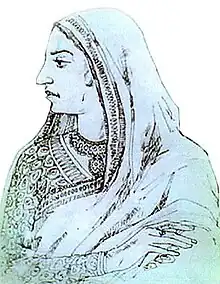
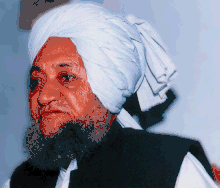
.jpg.webp)
